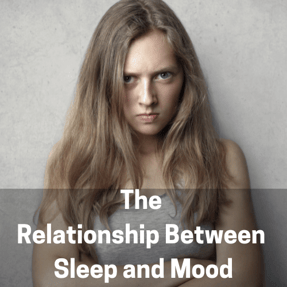
Imagine it's one of those nights where you have gotten a poor night's sleep. Your alarm goes off way too early, and you are in disbelief that you have to get up and be productive for an entire day. For the rest of the day, you may be tired, irritable, and a huge grump. These feelings are natural and experienced by most individuals with poor sleep. Your sleep and mood are interconnected because sleep is important for brain function and mood is controlled by your brain. Keep reading to find out more about the relationship between sleep and mood.
How your mood is regulated
Mood, or emotion regulation, is a practice where you learn how to control your feelings. Emotion regulation is different for every person and every situation. For instance, if you're feeling sad, you may think about something happy to enhance your mood. If you're feeling stressed or anxious, you may use a coping skill to relax yourself. All of these methods of change are a part of emotion regulation. Different parts of your brain work together to manage your mood, a practice that takes place nonstop throughout the entire day.
How a lack of sleep impacts your mood
When you are sleep-deprived, your brain does not receive the full recharge that it needs for another day. Maybe you were in bed for the full 8-10 hours, but you tossed and turned. Or perhaps you got into bed late and had to wake up after only a few hours to get to work. Whatever the cause of your sleep deprivation is, you may see a negative impact on your mood, especially if the sleepless nights add up.
Those with poor sleep schedules were more likely to experience negative moods like anger and irritability. Even the smallest inconvenience or something going wrong can cause the biggest reaction because you're just unable to fully process the situation. When your brain doesn't get enough rest, it doesn't have the horsepower to properly carry out all of its functions. This leads to feelings of frustration, an inability to concentrate, and an overall lack of enthusiasm even with good news.
How your mood can impact your quality of sleep
The relationship is also true in reverse. Your mood can impact the quality of sleep that you get. Feelings of anxiety or agitation that you experience right before bed can make it hard to sleep. Have you ever been nervous or excited about something and tossed and turned because you couldn't sleep? Or maybe you've gotten into a huge fight or are angry and find it hard to turn your mind off to go to sleep.
These emotions can make it very difficult for you to go to sleep. They keep your body aroused and alert when it is supposed to be relaxed, preparing for sleep. Your body is essentially in "fight or flight" mode which gets your adrenaline pumping and puts your body on alert for danger. The hormones pumping through your body are antagonistic to your sleep efforts, which can lead to poor sleep quality and quantity. This night of poor sleep then just contributes to a negative mood during the day, and the cycle continues.
The link between sleep deprivation and psychiatric disorders
If your sleep problems persist long enough, those bad and grumpy days turn into bad and grumpy weeks and months. Depression and anxiety are diagnosable psychiatric disorders that can develop after prolonged sleep deprivation. A lack of sleep increases your chances of developing one of these mood disorders, potentially due to poor day-to-day functions that can contribute to an overall negative or anxious outlook on life.
Chronic insomnia can especially put you at risk for developing depression or anxiety. In fact, one study showed that adults with insomnia were five times more likely to develop depression. The same study showed that these adults were 20 times more likely to develop a panic disorder. Another study showed that chronic insomnia was a positive predictor of psychiatric disorders, including other anxiety disorders.
If you find yourself having trouble sleeping, don't let it go untreated. If left untreated, sleep deprivation can cause a host of issues, including mood disorders. You may try mindfulness or meditation techniques to relax before bed. Even creating a good sleep schedule can assist with falling asleep. For more direction on these approaches, or to talk with a sleep professional, please contact our office for a consultation by filling out the form below.
[Sources]:
https://www.betterhealth.vic.gov.au/health/HealthyLiving/Mood-and-sleep
https://www.psychologytoday.com/us/basics/emotion-regulation
https://healthysleep.med.harvard.edu/need-sleep/whats-in-it-for-you/mood
